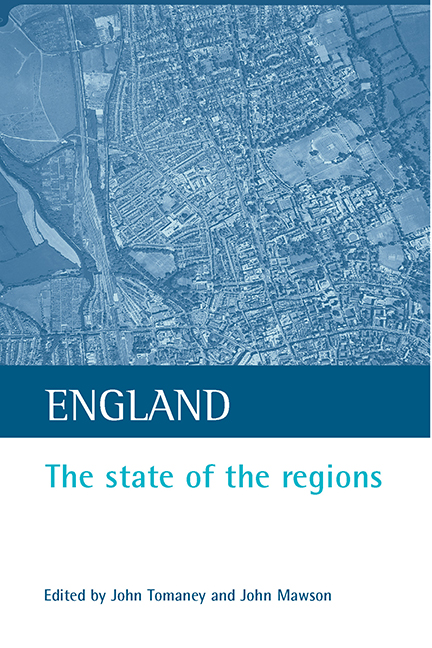Book contents
- Frontmatter
- Contents
- List of tables and figures
- Acknowledgements
- List of contributors
- one Introduction
- two Regional government in England: reviewing the evidence base
- three New Labour and the evolution of regionalism in England
- four Yorkshire (and the Humber)
- five Institutional collaboration in the West Midlands region
- six England's North West
- seven The South West
- eight Regionalism in the East of England
- nine The South East region?
- ten Regionalism in North East England
- eleven Regional strategy development in the East Midlands
- twelve The problem of regional governance
- thirteen Elected regional government: the issues
- fourteen Barnett plus needs: the regional spending challenge in Britain
- fifteen Conclusion: prospects for regionalism
- Index
- Also available from The Policy Press
one - Introduction
Published online by Cambridge University Press: 20 January 2022
- Frontmatter
- Contents
- List of tables and figures
- Acknowledgements
- List of contributors
- one Introduction
- two Regional government in England: reviewing the evidence base
- three New Labour and the evolution of regionalism in England
- four Yorkshire (and the Humber)
- five Institutional collaboration in the West Midlands region
- six England's North West
- seven The South West
- eight Regionalism in the East of England
- nine The South East region?
- ten Regionalism in North East England
- eleven Regional strategy development in the East Midlands
- twelve The problem of regional governance
- thirteen Elected regional government: the issues
- fourteen Barnett plus needs: the regional spending challenge in Britain
- fifteen Conclusion: prospects for regionalism
- Index
- Also available from The Policy Press
Summary
This book examines aspects of the governance of England in a devolved (or devolving) United Kingdom. On the face of it, devolution is a process, which has yet to impact on England directly. In contrast to Scotland, Wales and Northern Ireland, the English have tended to remain indifferent to the appeal of devolved institutions. England, because of its size, has dominated the UK, while generally acknowledging the national traditions and aspirations of its other components, especially Scotland. Unlike Scotland or Wales, there has been little demand for the (re)creation of an English Parliament in the past century. The lack of interest of the English in a parliament of their own helped to scupper initiatives such as ‘Home Rule All Round’ prior to the First World War. From time to time over the past century or so, commentators have suggested a federal system in which England would form one element alongside Scotland and Wales. However, this solution has generally been rejected as unsustainable. An English Parliament representing a population of 45 million, compared to Scotland's population of five million and Wales’ population of three million, would overshadow any federal parliament.
At the same time, it is frequently argued that England lacks traditions of regionalism or, as Harvie (1991) puts it, English regionalism is “the dog that never barked”. It is certainly true that the English political class has shown itself uninterested in the kind of issues that arouse great passions in Scotland. It is sometimes argued that this is because England can boast a ‘one thousand-year history’ of integrated governance stretching back to the Norman Conquest. In 1885 the celebrated constitutional theorist A.V. Dicey could argue:
Two features have at all times since the Norman Conquest characterized the political institutions of England.… The first of these features is the omnipotence or undisputed supremacy throughout the whole country of the central government.… The second, which is closely connected with the first, is the rule or supremacy of law. (Quoted in Weir and Beetham, 1999, p 6)
Such a constitutional theory would appear to leave little space for regionalism within English political culture and administration. Attempts were made to introduce regional planning structures into England in the 1960s and 1970s by Labour governments.
- Type
- Chapter
- Information
- EnglandThe State of the Regions, pp. 1 - 10Publisher: Bristol University PressPrint publication year: 2002

